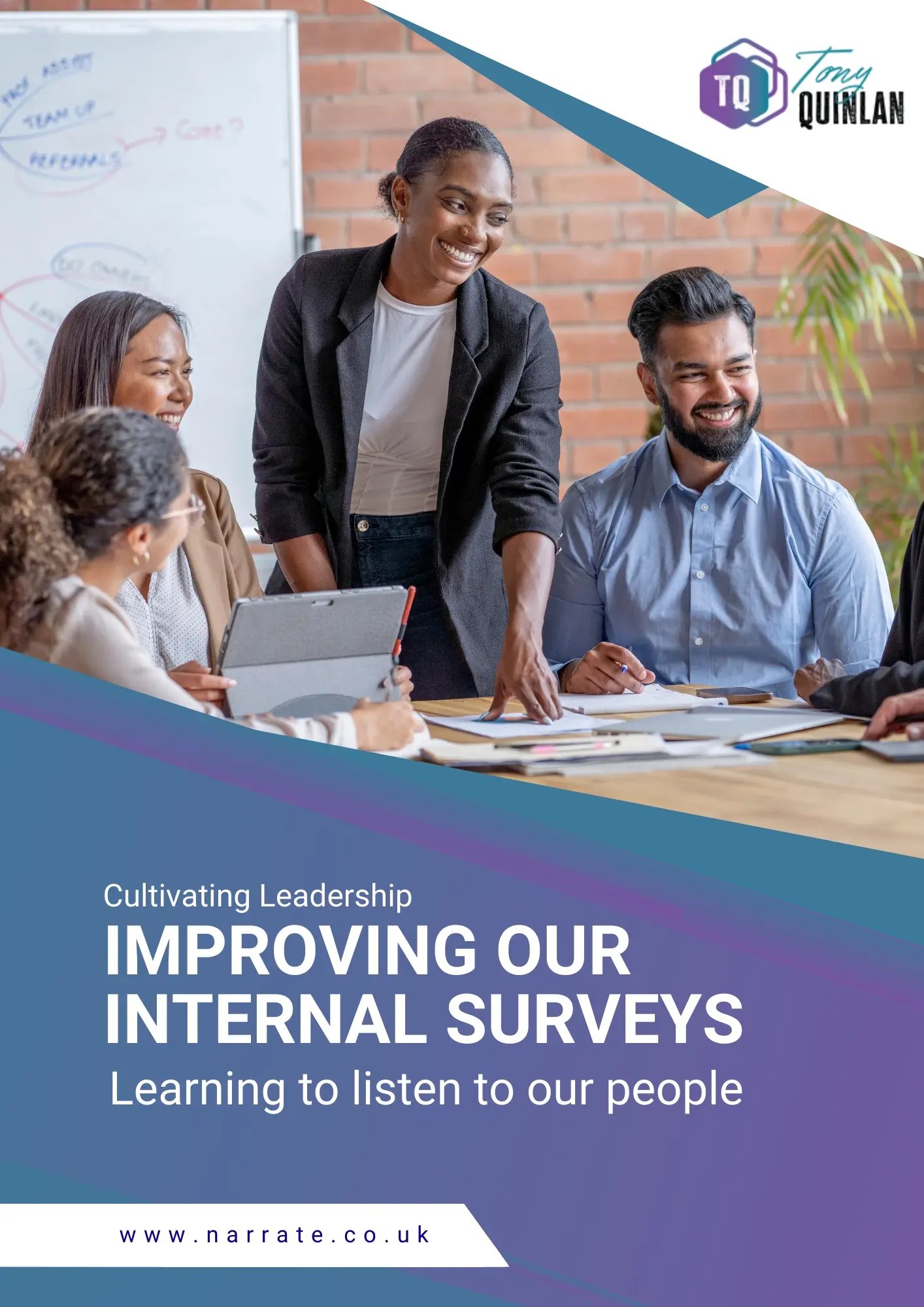For over two decades, from 2000 to 2024, Narrate was the vehicle for all my narrative work. That’s a long time in the world of organisational research , and it's given me a depth of experience that's hard to match. Now, as I continue this work under the Tony Quinlan banner, I'm bringing all that knowledge and expertise to bear on your most complex challenges.
At Narrate, we use narrative research to help you uncover new insights from large volumes of qualitative data, and use these insights to ignite change in your organisation. Our team will help you identify outliers or weak signals of impending change, so you can better understand diverse perspectives and make more informed, agile decisions.

What Is Narrative Research?

Let's be honest - the term 'narrative research' can sound a bit woolly. But at its core, it's about something fundamentally human: stories. I'm not talking about grand epics here, but the small, everyday stories that people tell about their experiences. These micro-narratives are goldmines of insight into how people really think, feel, and behave.
Here's the thing: people don't always do what they say they do, or even what they think they do. Traditional surveys might tell you what people believe about themselves, but narrative research reveals how they actually live and make decisions. It's the difference between asking someone to list their values and watching how they behave when they think no one's looking.
Why Bother With All These Stories?
You might be wondering why I'd go to all this trouble. After all, wouldn't it be easier to just send out a survey and be done with it? Well, yes, it would be easier. But if you want to really understand what's going on in your organisation or community, and more importantly, if you want to know how to actually change things, you need to dig deeper.
Narrative research allows me to:
Uncover the hidden patterns in how people behave and make decisions
Identify the early warning signs of changes in your organisation or market
Understand the complex web of relationships and influences that shape your environment
Find the potential leverage points where small changes can have big impacts
In other words, it gives you the kind of insights that can make the difference between a change program that fizzles out and one that fundamentally transforms your organisation.
I use a clever piece of software called SenseMaker. It’s like a Swiss Army knife for narrative research – versatile, powerful and occasionally a bit tricky to use if you don’t know what you’re doing. Luckily I’ve been using it for 15 years across six continents, so I know many of its quirks and capabilities.
Here's the basic process:
Now, I won't pretend this is always a smooth, easy process. SenseMaker is a sophisticated tool, and designing a good project takes skill and experience. But over the years, I've developed a structured approach that lets me manage this complexity. This means you can focus on the insights and implications, rather than getting bogged down in the technical details.
What Can You Actually Do With This?
Glad you asked, Over the years, I’ve used narrative research to:
![]() Help brand managers to change Pfizer salespeople’s negative perceptions of a product
Help brand managers to change Pfizer salespeople’s negative perceptions of a product
![]() Identify core messaging to generate better health outcomes in Bangladesh
Identify core messaging to generate better health outcomes in Bangladesh
![]() Show change managers at a major Silicon Valley tech company what needed fixing before they launched a customer-centric change program
Show change managers at a major Silicon Valley tech company what needed fixing before they launched a customer-centric change program
![]() Uncover customer concerns and opportunities around call centre responses for a major telecom in India
Uncover customer concerns and opportunities around call centre responses for a major telecom in India
![]() Give leaders clear insights and actions to change perceptions of poor hierarchy and management within a European Commission organisation
Give leaders clear insights and actions to change perceptions of poor hierarchy and management within a European Commission organisation
![]() Highlight early warning signs of community breakdowns in conflict zones like Yemen for a United Nations organisation
Highlight early warning signs of community breakdowns in conflict zones like Yemen for a United Nations organisation
![]() Shape new onboarding experiences to help integrate new employees without losing their fresh perspectives
Shape new onboarding experiences to help integrate new employees without losing their fresh perspectives
![]() Improve safety in the utilities sector by showing where systems were failing employees
Improve safety in the utilities sector by showing where systems were failing employees
![]() Show leaders where their behaviour was creating a culture of silence in the healthcare sector
Show leaders where their behaviour was creating a culture of silence in the healthcare sector
![]() Uncover simple changes to improve patient perception of hospitals in Northern Ireland
Uncover simple changes to improve patient perception of hospitals in Northern Ireland
![]() Explore opportunities to create greater innovation in the defence sector
Explore opportunities to create greater innovation in the defence sector
![]() In each case, narrative research revealed insights that traditional methods had missed, and pointed the way to practical, effective actions.
In each case, narrative research revealed insights that traditional methods had missed, and pointed the way to practical, effective actions.
Is This Right for You?
If you're grappling with a complex challenge, if you feel like you're missing part of the picture, or if you simply want to understand your organisation or community better, narrative research might be worth exploring.
It's not about getting all the answers - it's about asking better questions and seeing the patterns that matter. And in today's complex, fast-changing world, that can make all the difference.
Ready to dive into the world of narrative research? Let's talk. Just don't expect me to solve all your problems overnight. I'm more of a 'steady progress through complexity' sort of chap. But I promise it'll be an interesting journey.
How It Works: Narrative Research Methodology
So, how does narrative research work in practice using your organisation’s experiences? qualitative data?
Understanding lived experiences:
The core principle of narrative research is to understand the world through the lens of individual lived experiences. Lived experience is what it is subjectively like to be a certain person at a certain time – and may be quite different from how other people around them see the world or the individual concerned. Researchers analyse narratives to uncover themes, emotions, motivations, and decision-making processes behind the stories. In immersing themselves in these personal accounts, narrative researchers piece together a more holistic understanding of how human beings perceive and react to their environments, offering a more reality-based model of human behaviour and the factors influencing it.
Focus on stories:
Narrative research gathers data through individuals' stories, either spoken or written. These stories can be personal experiences, historical accounts, cultural myths, or even fictional narratives that offer insights into human behaviour and social dynamics. Each story opens a unique window onto human behaviour in a particular context, frequently revealing underlying connections that help us understand how individuals navigate their world and make the decisions they do.
Beyond standard surveys:
While traditional surveys provide a snapshot of data – a rating of how people are feeling – they often leave organisations unsure about what to do to improve things or why the rating is how it is. Narrative research transcends these limitations by delving into the context and nuances that standard surveys frequently miss. For example, by gathering narratives from your employees, customers, or broader populations, researchers can uncover the triggers behind people’s emotions, the obstacles they face in their day-to-day lives and roles, what really matters to them, and examples of what leaders might do or stop doing to change things. Narrative research thus transforms raw data into actionable insights, bridging the gap between understanding and action.
The Advantages Of Narrative Research:
Uncover deeper insights:
traditional research often focuses on demographics and data points – the surface level information that reveals what but not always why. Narrative research listens to people’s stories, unlocking rich insights into individual motivations, emotional triggers, and the decision-making processes behind purchases and behaviours.
Building emotional connections:
human beings are wired to connect with stories. Narrative research uses this innate affinity to help organisations create compelling narratives that extend beyond features and specifications. By weaving the essence of people’s experiences into your work, your services and your products, you can cultivate more authentic and lasting connections with your target buyers.
Innovation and problem solving:
the true potential of narrative research lies in its ability to spark ideas for the future. By analysing customer stories, you can identify hidden themes and patterns within your customer experiences. These insights can serve as a catalyst for innovation, revealing opportunities for new services or products, or enhancements to align with customer needs and expectations.
Stronger brand differentiation:
in a crowded marketplace, a compelling narrative can differentiate your organisation. Narrative research helps you to identify and articulate your unique value proposition through the power of storytelling, communicating the core values and qualities that set you apart.
Deeper cultural understanding:
Narrative research helps organisations truly understand their employees' lived experiences and perspectives. By listening to employee stories, leaders can map the cultural landscape, identify both opportunities and barriers to change, and build authentic paths forward that resonate with their workforce's real needs and aspirations. This deeper understanding creates the foundation for meaningful organisational evolution.
Book a meeting with Tony
Curious about what's really shaping people's behaviours? Let's have a quick conversation.
When you need to understand how large groups of people think and act - whether that's employees, customers, or communities - standard surveys often miss crucial insights. I've helped organisations gather richer, more nuanced understanding of what's actually happening and what might help shift behaviours.
![]() Capture the real stories that drive decisions and actions
Capture the real stories that drive decisions and actions
![]() Spot patterns that surveys and focus groups might miss
Spot patterns that surveys and focus groups might miss
![]() Understand what could help change happen naturally
Understand what could help change happen naturally
![]() Find practical ways to monitor change as it emerges
Find practical ways to monitor change as it emerges
![]() Give people a genuine voice in shaping what happens next
Give people a genuine voice in shaping what happens next
If you're wrestling with understanding complex human situations, book a 15-minute chat. We can explore whether narrative research might be useful for your situation.
What's Next?
Countries |
Topics |
What Narrate did |
|
Pakistan Bangladesh United Kingdom Kyrgyzstan Georgia Belarus Serbia Italy Bosnia-Herzegovina Montenegro Libya Egypt Netherlands Saudi Arabia Jordan Portugal Rwanda Ethiopia Spain Democratic Republic of Congo Afghanistan Germany Yemen USA Honduras Colombia Israel Uganda France Yemen Laos Canada Moldova UAE |
Customer loyalty Security and stabilisation Employee engagement and culture change Poverty reduction Salesforce improvement Gender attitudes Radicalisation Customer needs Cultural assessment Government engagement and mandate Building sustainable livelihoods Attitudes to minorities Organisational innovation Economic empowerment and improvement Health service improvement Understanding employee resistance to change Exploring human rights implementation Monitoring organisational change Improving leadership skills Enhancing existing training programmes
|
Research into initial crisis conditions Full project to explore multiple stakeholder/department needs in single project Results presentation Designed research for local/client data gathering Data gathering Training and mentoring of client staff Ran workshops to design interventions with multiple stakeholders Monitored effects while client programmes were running Enhancing media campaigns through local content gathering Analysis of previously collected data Participative analysis workshops Designed frameworks for narrative (SenseMaker®) research Review of client/colleague-designed frameworks |
Where these approaches have made a difference
I've worked with leaders facing complex challenges across a diverse range of settings - from government departments wrestling with policy implementation to tech companies navigating rapid growth. Different sectors, similar patterns, uniquely customised approaches.
Business & Industry
Government & Public Service
International Development
I've partnered with development organisations to make programs more effective and locally-owned. My work has focused on introducing adaptive management approaches, creating ways for local voices to influence decisions, and helping teams bridge the gap between high-level objectives and on-the-ground realities.
Organisations I have worked with



















Our blog

Building Teams That Can Effectively Manage Conflict

How Narrative Analysis Can Help To Improve Service Delivery In Healthcare






